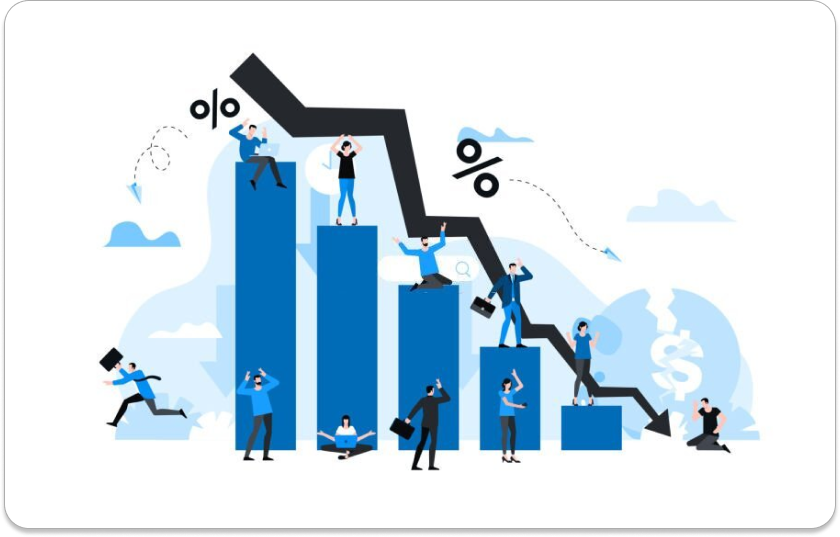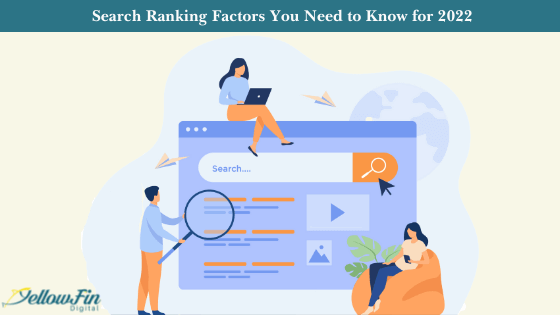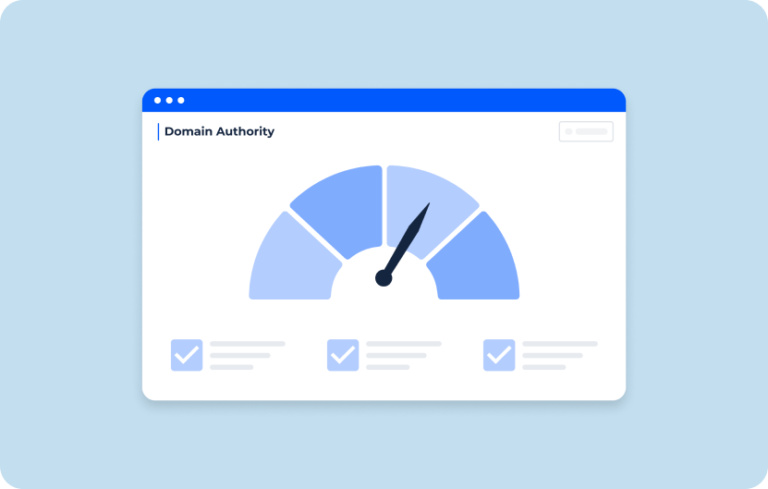Introduction:
Experiencing a sudden decline in organic traffic is a common concern among website owners. It leaves them asking, “Why did my organic traffic drop suddenly?”
Many factors can contribute to a decrease in web traffic, resulting in fewer conversions. For instance, search engine algorithm updates, changes in published content, and increased competition from rival websites can all play a significant role.
Unfortunately, when faced with such a dilemma, many website owners panic and seek misguided advice, which worsens the situation. However, with the support of a reputable Austin SEO company like YellowFin Digital, it is possible to reverse this decline and safeguard your business from other risks.
This blog post will explore the causes, diagnoses, and solutions for sudden organic traffic dips.
Troubled by a sudden drop in organic traffic to your website?
Regain your traffic and revitalize your online presence with
YellowFin Digital’s SEO experts
Common Causes Of Drop in Organic Traffic
When your organic search traffic suddenly takes a nosedive, it’s crucial to figure out why it happened so you can address the issue effectively. Let’s be clear about what we mean: we’re specifically talking about a sharp decrease in traffic from search engines due to regular SEO and content marketing efforts, excluding ads, backlinks, email campaigns, or social media.
It’s important to distinguish between a sudden drop and a gradual decline over several months, although many of the same SEO tactics can help with the latter. For most small businesses, organic traffic tends to stay relatively steady. If you have a well-optimized business blog and consistently publish at least one new article per month, you should generally see minor fluctuations or even a gradual increase.
However, if you’re more aggressive with your content marketing strategy, releasing new content might result in noticeable spikes in organic traffic, sometimes with larger monthly increases. So, if you experience a sudden drop in this situation, it means something significant happened, and you should investigate immediately.
Now, let’s explore the common reasons behind the decline in organic search traffic.
Neglecting Technical SEO

Failing to address technical SEO issues on your website can harm your organic traffic. You obviously wouldn’t want to ignore these issues, whether intentionally or unintentionally, as they can cause your visibility and organic search performance to plummet. It’s a must to identify and fix any technical bugs that hinder search engines from effectively crawling, rendering, or indexing your website.
Common technical barriers that you should be aware of:
- Mistakes with robots.txt or meta robots tags can unintentionally block search engines from accessing and indexing your content.
- Using a temporary 302 redirect instead of a permanent 301 redirect can result in losing search engine authority and negatively impact your organic rankings.
- Broken or dead links on your website create a poor user experience and signal to search engines that your site may be outdated or unreliable.
- Inadequate internal linking can hinder search engines from understanding the relationships between your website’s pages, potentially impacting their indexation and ranking.
- Search engines strive to deliver unique and valuable content to users. Duplicate, common content found elsewhere, and low-quality content can harm your organic rankings.
- Incorrect or improperly implemented analytics tracking code can result in data discrepancies, hindering your ability to make informed decisions about your website’s performance.
- An improperly formatted or outdated XML sitemap can prevent search engines from efficiently discovering and indexing your website’s pages.
- Security breaches can damage your website’s reputation and trustworthiness. Search engines may flag infected or hacked sites, resulting in a significant drop in organic traffic.
- Slow site speed, mobile usability issues, and poor server response time all contribute to a subpar user experience.
Altogether, these technical issues can significantly impact your organic traffic. Regularly auditing your site for technical issues and promptly addressing them with Austin SEO servicesprofessionals’ expertise is vital to maintaining a healthy online presence.
Impact of Google Algorithm Updates
Google frequently introduces algorithm updates to enhance the search experience for users. These updates can impact your website’s traffic if it is not optimized according to the new algorithms.
Let’s understand this better with an example:
Suppose you have an online fashion store. Google updates its algorithm to favor websites with high-quality product images and detailed descriptions. If your store lacks these elements, your site may experience a decrease in rankings and traffic.
However, it’s important to note that only some algorithm updates rolled out by Google will significantly affect your website. While minor updates have minimal effects (with hundreds occurring yearly), broad core updates can bring more significant changes, especially if your website does not meet Google’s quality standards.
To successfully navigate these updates, staying informed about the latest SEO trends and developments, especially those relevant to your industry, is essential.
Navigating Changes in Website Structure
Have you recently made any updates to your website, such as adding or removing pages or undergoing a site redesign or migration? These modifications have the potential to impact your site’s accessibility and, consequently, result in a decrease in organic traffic if not handled properly. Moreover, significant changes to your site’s content and user experience can trigger a sudden drop in organic traffic.
For instance, let’s say you implemented a new feature that requires users to log in before accessing certain pages. This change could limit access to those pages and potentially lead to a reduction in traffic.
It’s important to be mindful of such modifications’ impact on organic traffic. Before implementing any changes, ensure proper redirections, and conduct a thorough check to ensure a seamless transition.
Furthermore, if you notice a decline in traffic, it may indicate underlying issues within your SEO strategy that require attention and resolution.
Manual Actions and Penalties

To maintain the integrity of search results, Google takes strict measures against websites that employ unethical practices to manipulate their rankings. These practices, known as black hat tactics, can lead to manual actions and penalties imposed by Google.
Such actions’ repercussions can significantly impact your website’s performance, including a substantial decrease in traffic and rankings. Sometimes, your website may be entirely removed from Google’s index, making it invisible in search engine results.
- Identifying and Notifying the Issues
When a manual action is taken against your website, Google will promptly inform you through the Manual Actions Report in the Google Search Console. This report will detail the specific violations or issues that have led to the manual action being imposed.
- Taking Remedial Steps
To recover from manual action, addressing the identified violations and rectifying the issues promptly is crucial. Once you have resolved the problems, you can request a reconsideration from Google using the ‘Request Review’ option. This demonstrates your commitment to rectifying and adhering to ethical norms outlined in Google’s guidelines.
Insufficient Content Planning and Publishing
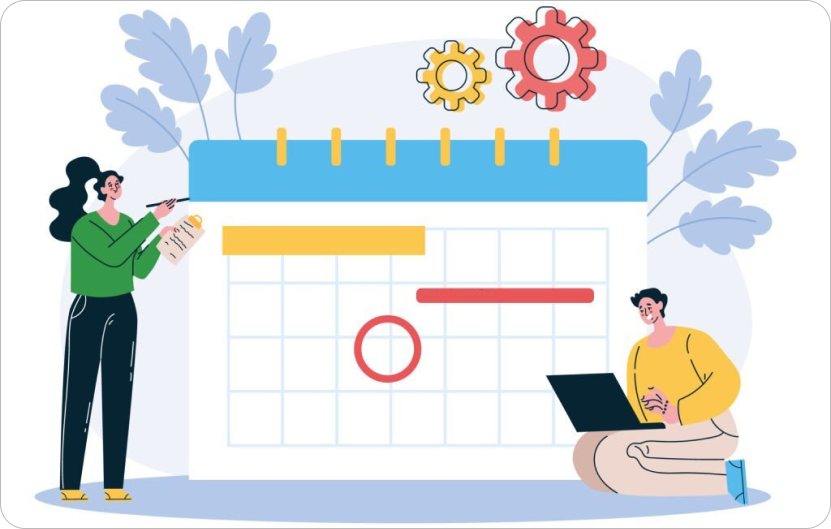
The quality of your website’s content plays a crucial role in attracting and retaining visitors. If the content becomes irrelevant or uninteresting to users, they will likely stop visiting, resulting in a decline in organic traffic. Thus to address this, it’s essential to enhance your keyword research to identify relevant topics and plan a comprehensive content calendar.
Another factor affecting your traffic is the publishing velocity or the frequency at which you release new content. When the publishing rate decreases, search engine crawlers visit your site less frequently, potentially causing them to miss important updates. This can give your competitors an advantage as they provide more recent and up-to-date information.
Moreover, errors or typos in your website’s content can also negatively impact its visibility. It’s worth noting here that Google has been actively targeting poorly written AI-generated content and content with grammatical errors. Therefore, maintaining high-quality content free from grammatical flaws is crucial to maintaining organic traffic and search visibility.
Impact of Competitor Activity
In today’s competitive landscape, your competitors’ activities can significantly impact your website’s organic traffic. If you observe a decline in traffic, it’s crucial to consider the influence of your competitors and their SEO strategies. Their websites may be better optimized for search engines, resulting in higher rankings and attracting more visitors.
How to Analyse Your Website Traffic Decline?
When analyzing organic website traffic, one effective approach is to dive into your website’s analytics data. This allows you to gain valuable insights into various aspects, such as:
- Sources of your organic traffic
- Pages that receive the most views
- How users interact with your site as a whole
To make the most of this analysis, you’ll need to leverage powerful tools that can provide you with the necessary data and insights. Here are some valuable tools that can assist you in this process.
Google Search Console
Google Search Console is a powerful tool that provides detailed insights into your website’s performance in Google search results. It offers a range of features to diagnose potential issues affecting organic traffic. You can access data on crawl errors, index coverage, manual actions, and more.
By monitoring the Search Console regularly, you can identify any notifications or alerts related to traffic decline and take necessary actions to rectify the identified issues.
Google Analytics
Google Analytics is a comprehensive analytics platform that offers valuable data on website traffic, user behavior, and conversion rates. By examining the Audience and Acquisition sections, you can gain insights into the sources of your organic traffic and identify any significant drops.
Pay attention to metrics such as sessions, page views, bounce rate, and average session duration to pinpoint areas where the decline occurs. This data can help you uncover trends and make informed decisions to improve organic traffic.
Third-Party SEO Tools
Several third-party SEO tools like Ahrefs, Semrush, and Moz offer comprehensive features for tracking keyword rankings, backlinks, and competitor analysis. These tools allow you to identify keywords or pages that may have experienced a decline in traffic and provide insights to help you address the issue effectively.
Heatmap and User Behaviour Tools
These tools provide visual representations that track user interactions, such as clicks, scroll depth, and mouse movement. By analyzing this data, you can better understand how visitors engage with your content and identify areas where user engagement is low or potential usability issues exist.
Social Media Analytics
For websites that receive significant traffic from social media platforms, it’s crucial to evaluate the performance of your social media campaigns. Leverage social media analytics platforms like Facebook Insights, Twitter Analytics, and LinkedIn Analytics. These tools offer valuable data on metrics such as post reach, engagement, and click-through rates. Monitoring these metrics enables you to identify any shifts in social media-driven traffic and adjust your social media strategies.
Effective Ways and Best Practices to Win Back Lost Traffic

Winning back lost traffic requires implementing effective strategies and best practices. Here are some steps you can take to regain your website’s traffic:
Check Your Website
Thoroughly assess the overall health of your website, including its hosting and server performance, security measures, and uptime. Pay attention to any notifications or alerts in your platform dashboard. Additionally, gather customer feedback to identify potential issues they may have encountered while browsing your site.
Prioritise On-Page SEO
When facing a significant drop in traffic, the last thing you want is a negative SEO impact. To address this, focusing on your on-page SEO becomes crucial. Here are steps you can take to improve the situation:
- Optimize Content with Relevant Keywords: Ensure your content is high quality and provides value to your readers. Choose keywords that have the potential to attract more visitors to your website. Place these keywords naturally within your content, avoiding any unnatural keyword placement or keyword stuffing that can harm your SEO efforts.
- Use Compelling Headings and Meta Tags: Include your chosen keywords in compelling headings and meta tags. This helps improve the visibility of your pages in relevant Google searches, attracting more organic traffic to your site.
- Strengthen Internal Linking: Enhance your website’s internal linking structure by including links within your content that lead to other relevant pages on your site. This helps users explore more information and helps search engine spiders understand the context and relevance of your content.
- Avoid No-index Tags: Ensure that none of the pages you want Google to rank have a no-index tag. This tag instructs search engines not to include the page in search results, which can negatively impact your organic traffic.
Stay Updated and Adapt Your SEO Strategy
Optimizing your website for search engines is an ongoing process that requires continuous effort to attract traffic. Here’s what you can do to nail it:
- Perform Regular Site Audits: Conduct periodic sitewide audits to ensure your website performs optimally. Check for technical issues, assess content quality, review page speed, and evaluate backlinks. By identifying areas for improvement, you can make necessary changes to enhance your website’s performance.
- Stay Informed about Google’s Algorithm Updates: Stay updated with the latest Google algorithm updates by conducting online research. If Google has released a broad core algorithm update, find its focus areas, such as content quality, page speed, questionable backlinks, or trustworthiness. If any of these aspects are targeted, it’s essential to take action to improve your content or the overall quality of your website.
Analyze Your Competitors’ Websites
Monitoring your competitors’ activities and adjusting your SEO strategy is imperative to stay ahead in the competitive market. Austin SEO Agency suggests the following approach to tackle this challenge effectively:
- Conduct a comprehensive competitor analysis: Delve into your competitors’ websites and closely examine their SEO tactics. Analyze the keywords they are targeting, the quality of their content, and their overall online presence.
- Identify areas for improvement: Determine specific areas where your competitors outperform you. This could include content relevance, user experience, or the strength of their backlink profile.
- Enhance your SEO strategy: Based on the insights gained from your competitor analysis, develop a tailored SEO strategy to outshine your rivals. Pay attention to optimizing your website’s content, improving the user experience, and strengthening your backlink profile.
- Monitor and adapt: Keep a vigilant eye on your competitors’ activities and stay informed about the latest industry trends and SEO best practices. Continuously refine your strategy to maintain a competitive edge.
Improve Your Technical SEO
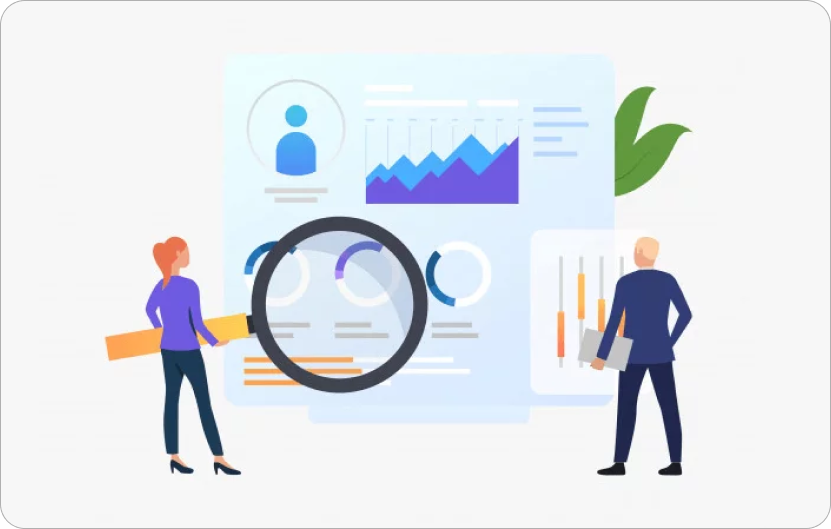
Technical issues on your website can cause havoc if you lack the necessary measures to resolve them. Areas to pay attention to:
- Enhance Website Speed and Performance: Utilize tools like PageSpeed Insights to assess your website’s speed and performance. Take immediate action to address any areas that require improvement, as a slow-loading site can negatively impact user experience and search engine rankings.
- Optimize for Mobile Devices: Given that over half of online searches occur on mobile devices, running a Mobile-Friendly Test is crucial to ensure your website is easily accessible and displays properly on mobile devices. Make necessary adjustments to enhance the mobile user experience.
- Fix Broken Links and Redirects: Broken links and redirects can frustrate users and search engines. Use a broken link checker to identify and replace broken links on your website. When you move content to a different URL, implement 301 redirects to redirect users from the old page to the new destination.
- Ensure Proper Indexing by Google: You won’t receive organic traffic if Google does not index your pages. To encourage faster indexing, consider the following steps:
- Remove any robots.txt file that may be blocking Google bots from accessing your content.
- Include non-indexed pages in your sitemap to signal their importance.
- Evaluate and remove canonical tags that may be affecting indexing.
- Improve the quality of your content to make it more valuable and relevant.
- Implement internal linking to connect the page with other relevant pages on your website.
- Manually request Google to index your page through the Google Search Console.
Build Powerful Backlinks
As you may already know, backlinks play a significant role in Google’s ranking algorithm. The higher your ranking, the more traffic you can attract, and vice versa. It’s an essential aspect of building a strong online presence.
To recapture lost traffic, directing attention toward generating high-quality backlinks from authoritative websites within your niche is paramount. Such backlinks enhance your visibility in search engine results and attract valuable referral traffic to your site.
So, how can you accomplish this? Here are some effective strategies for cultivating these valuable backlinks:
- Seek Guest Contributions: Contribute valuable content to reputable websites within your industry. This allows you to showcase your expertise and earn backlinks to relevant pages on your site. Focus on authoritative sites that attract your target audience.
- Engage with Bloggers and Influencers: Reach out to influential bloggers and thought leaders in your niche. Highlight the value of your content and persuade them to link back to your website. Building relationships with key influencers can lead to valuable backlink opportunities.
- Leverage Backlink Building Services: Consider partnering with a reputable backlink building service provider who can help secure quality backlinks on your behalf, saving you time and effort.
Although creating high-quality backlinks is important, it can be challenging and time-consuming for some. However, if you cannot undertake this task, you can explore alternative strategies to improve your website’s rankings without relying heavily on backlinks.
Seek Guidance from Experts
If you’re still struggling to regain lost traffic and overcome your challenges, it can be immensely valuable to seek guidance from experts. Partnering with a trusted Austin SEO company or consulting with experienced professionals can provide you with the expertise and insights needed to develop an effective strategy.
By working with experts, you can benefit from their in-depth knowledge of search engine algorithms, industry trends, and proven strategies for improving organic traffic. They can assess your website, identify areas for improvement, and provide actionable recommendations to enhance your SEO efforts.
How YellowFin Digital’s Professional SEO Services Can Help?
Organic traffic is essential for the success of your website, as it brings in potential business prospects that can become your customers without the need for a large advertising budget.
However, when your website experiences an unexpected and significant decline in organic traffic, it can leave you shocked and uncertain about the next steps. That’s where YellowFin Digital, the best SEO company in Austin, can help.
We understand the importance of organic traffic and offer tailored solutions to help you overcome this challenge. Our team of skilled professionals conducts a comprehensive analysis of your website, identifying the factors that have contributed to the decline in traffic. We then work diligently to recover your lost organic traffic and establish a robust online presence that ensures sustainable growth for your business.
Don’t let a sudden drop in organic traffic hold you back. Contact YellowFin Digital today to benefit from our SEO services and regain your website’s visibility.
